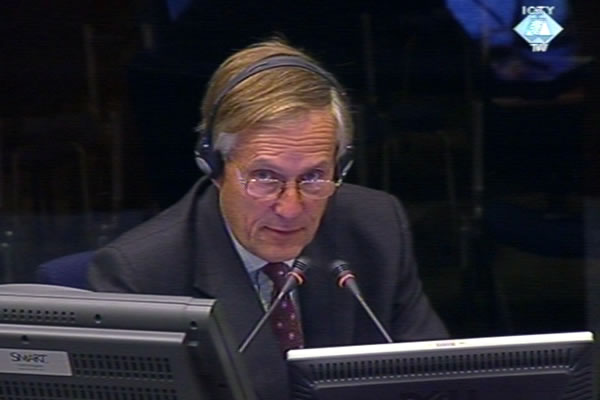Home
KARADZIC HAD ABSOLUTE CONTROL
In the final part of his cross-examination of General Michael Rose, Radovan Karadzic complained that the UN erroneously treated the Serb army as ‘rebels’ and ‘Muslim forces’ as legitimate. In the re-examination, the witness noted that in his view Karadzic’s effective control was ‘absolute’
 Michael Rose, witness at the Radovan Karadzic trial
Michael Rose, witness at the Radovan Karadzic trial Continuing his cross-examination of General Michael Rose, Radovan Karadzic claimed that the United Nations erroneously treated the Serb army as ‘rebels’ and the ‘Muslim forces’ as legitimate. This, Karadzic said, led the UN ‘to turn a blind eye’ to the attacks launched by the BH Army. When Serbs launched counterattacks, the UN responded with ‘criticism and intolerance and considered them as pressure’.
‘The status of the forces of the Bosnian state was different from that of the Bosnian Serb troops because the Bosnian state was recognized by the UN as its member state’, General Rose said, adding that the peace-keepers acted in line with the Security Council resolution recognizing BH as a sovereign state.
‘But, General, we too are Bosnia’, Karadzic said, implying that the misunderstanding between the Serb side and UNPROFOR was partly caused by the fact that the UN considered the Bosnian state headed by ‘the rump presidency’ as legitimate. General Rose confirmed that the UN and Bosnian Serbs differed on the issue.
Karadzic tried to prove that the Bosnian Serbs were not ‘genuinely’ ‘against the UN’, arguing that their actions were caused by ‘legitimate suspicion’ that the enemy ‘was taking advantage of UNPROFOR’, using humanitarian aid to military purposes. ‘It is entirely possible that we gave you fuel to maintain roads and that you used to fill up tanks’, General Rose replied to Karadzic.
Karadzic contended, among other things, that the VRS attack on Gorazde in the spring of 1994 was a ‘response’ to an offensive launched by the BH Army, noting that the Serb army didn’t intend to capture Gorazde. Karadzic referred to a note in Mladic’s diary which says ‘we took more than we planned, and the objective was to prevent attacks coming from Gorazde’.
In the re-examination, the prosecutor showed the witness a document of the VRS Main Staff sent on 12 April 1994 to the Herzegovina Corps and the Visegrad Tactical Group. The document says that the ‘president believes the Serb army has only three or four days to solve the issue of Gorazde; after that, an agreement to cease hostilities will most likely be signed’ and ‘the president insists and orders to make use of the forthcoming period and achieve as much as possible in the Gorazde region in the existing circumstances’.
‘My take on this document is that the Bosnian Serbs wanted to maximize their military advantage in those three days’, General Rose said. Prosecutor Edgerton asked the witness what he could conclude based on the document about Karadzic’s effective control over the army. ‘I would say it was absolute’, General Rose replied.
General Rose completed his evidence today. The trial continues next week with new prosecution witnesses.
Linked Reports
- Case : Karadzic
- 2010-10-07 KARADZIC – NATO WAS “TRIGGER HAPPY”
- 2010-10-06 KARADZIC: NO RECONCILIATION IF WE SHELLED THE MARKALE TOWN MARKET
- 2010-10-05 HOW KARADZIC’S ‘GOOD DEED’ TURNED INTO EVIDENCE FOR PROSECUTION
- 2010-10-11 THOUSAND DAYS OF UNCERTAINTY
- 2010-10-12 KARADZIC REJECTS SARAJEVO INVESTIGATIONS
- 2010-10-13 ‘RAISING DOUBTS’ ABOUT SARAJEVO INVESTIGATIONS FINDINGS
